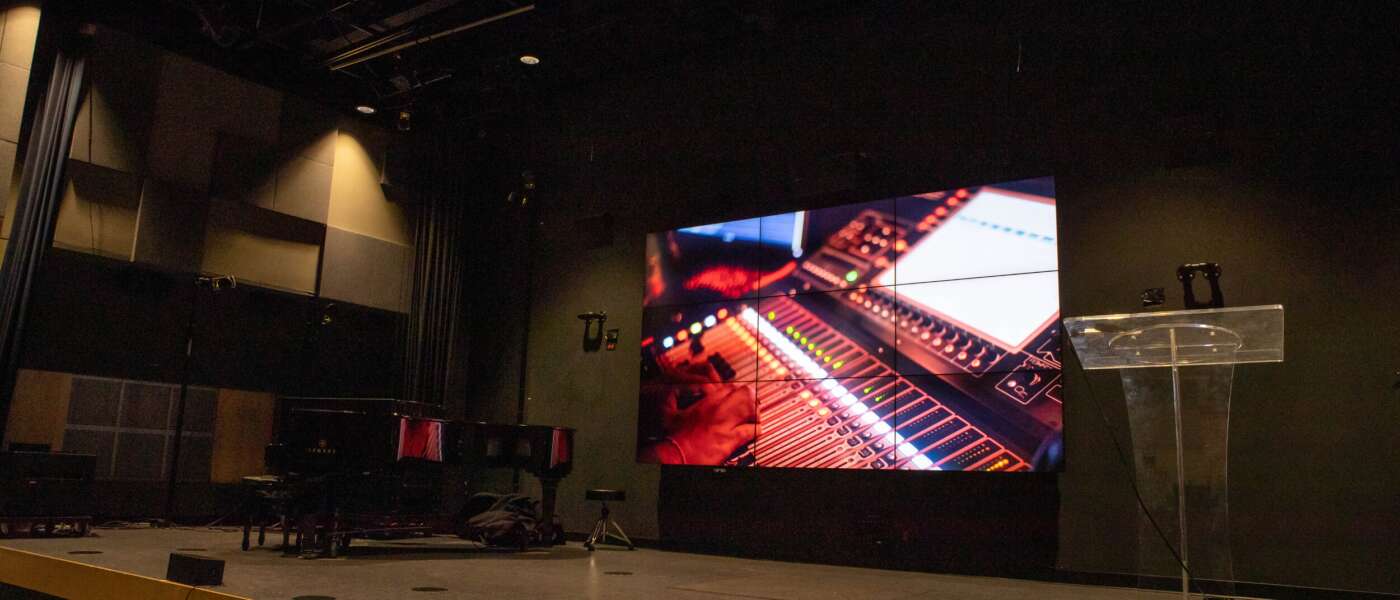
My research focuses on auditory development and the perception of music, including work on pitch, tonality, timing, rhythm, neuroplasticity, and the role of music in social interaction, development and developmental disorders (https://trainorlab.mcmaster.ca/). I am also the founding and present director of the McMaster Institute for Music and the Mind (MIMM), which houses the LIVELab (https://livelab.mcmaster.ca/), a unique research-concert hall with high acoustic control, that is equipped with multi-person motion capture and EEG for studying how performers and audiences interact, and how music can be used to promote health and well-being. One direction of my current research includes using motion capture, EEG, eye gaze, and physiological responses to study complex interactional dynamics, such as between musician as they perform, between musicians and audiences, and between caregivers and infants. A second direction focuses on the role of music and rhythm in early development, including EEG studies of rhythm processing in premature infants, the role of the microbiome in rhythm and social attentional development, and early musical behaviours of infants and toddlers.
Expandable List
Professor, Psychology, Neuroscience & Behaviour, McMaster University
Founding & Current Director, McMaster Institute for Music and the Mind, McMaster University
Senior Fellow, Canadian Institute for Advanced Research (CIFAR) Azrieli Program in Brain,Mind and Consciousness
Research Scientist, Rotman Research Institute, Baycrest Hospital
Associate Member, Department of Linguistics and Languages, McMaster University
Associate Member, Department of Communication Studies and Multimedia, McMaster University
- Saadatmehr,, , Edalati, M., Wallois, F., Ghostine, G., Kongolo, G., Flaten, E., Tillmann, B., Trainor, L. & Moghimi, S. (2024). Auditory rhythm encoding during the last trimester of human gestation: From tracking the basic beat to tracking hierarchical nested temporal structures. J. Neuroscience. e0398242024.
- McWeeny, S., Luoma, A. C., Al-Saleem, Y., & Trainor, L. J. (2024). Synchronous and anti-phase drumming elicit similar prosocial behaviour. Frontiers in Cognition, 3.
- Gervain, J., Kujala, T., Pena, M., Trainor, L. J., & Winkler, I. (2024). Editorial: Early development of sound processing in the service of speech and music perception. Frontiers in Human Neuroscience, 18:1471445.
- Pazdera, J., & Trainor, L. J. (2024). Pitch-induced illusory percepts of time. Attention, Perception, & Psychophysics. Attention, Perception, & Psychophysics. https://doi.org/10.3758/s13414-024-02982-8
- Poikonen, H., Tervaniemi, M., & Trainor, L. J. (2024). Expertise in dance and music modified cortical EEG oscillations during live dance performance. European J. Neuroscience. https://doi.org/10.1111/ejn.16525
- Edalati, M., Wallois, F., Ghostine, G., Kongolo, G., Trainor, L., & Moghimi, S. (2024). Neural oscillations suggest periodicity encoding during auditory beat processing in the premature brain. Developmental Science, e13550. DOI: 10.1111/desc.13550 (co-last authors)
- Carrillo, C., Chang, A., Armstrong, H., Cairney, J., McAuley, D., & Trainor, L. J. (2024). Auditory rhythm facilitates perception and action in children with probable Developmental Coordination Disorder. Scientific Reports. 14:12203 https://doi.org/10.1038/s41598-024-62322-6
- Nave, K., Carrillo, C., Jacoby, N., Trainor, L., & Hannon, E. (2024). The development of rhythmic categories as revealed through an interactive production task. Cognition, 242. https://doi.org/10.1016/j.cognition.2023.105634
- Dotov, D., Motsenyat, A., & Trainor, L. J. (2024). Concurrent supra-postural auditory-hand coordination task affects postural control: Using sonification to explore environmental complexity in factors affecting fall risk. Sensors, 24(6): 1994.
- Nave, K., Carrillo, C., Jacoby, N., Trainor, L., & Hannon, E. (2024). The development of rhythmic categories as revealed through an interative production task. Cognition, 242. https://doi.org/10.1016/j.cognition.2023.105634
- Dotov, D., Motsenyat, A., & Trainor, L. J. (2024). Concurrent supra-postural auditory-hand coordination task affects postural control: Using sonification to explore environmental complexity in factors affecting fall risk. Sensors, 24(6): 1994.
- Edalati, M, Wallois, F., Safaie, J., Ghostine, G., Kongolo, G, Trainor, L. J., & Moghimi, S. (2023). Rhythm in the premature neonate brain: Very early processing of beat and meter. J. Neuroscience, 43(15), 2794-2802. https://doi.org/10.1523/JNEUROSCI.1100-22.2023
- Hunter, S., Flaten, E., Petersen, C., Gervain, J., Werker, J. F., Trainor, L. J., & Finlay, B. B. (2023) Babies, Bugs and Brains: How the early microbiome influences infant brain and behavior development. PlusOne, 18(8), e0288689. https://doi.org/10.1371/journal.pone.0288689
- Large, E., Roman, I., Kim, J. C., Cannon, J., Pazdera, J., Trainor, L J., Rinzel, J., & Bose, A. (2023). Dynamical models of rhythm. Frontiers in Computational Neuroscience, 17,1151895. https://doi.org/10.3389/fncom.2023.1151895
- Nguyen, T., Flaten, E., Trainor, L. J., & Novembre, G. (2023). Early social communication through music: State of the art and future perspectives. Developmental Cognitive Neuroscience, 63, 101279. https://doi.org/10.1016/j.dcn.2023.101279
- Finnerty, R., McWeeney, S., & Trainor, L. J. (2023). Online group music therapy: proactive management of undergraduate students’ stress and anxiety. Frontiers in Psychiatry, 14, 1183311. https://doi.org/10.3389/fpsyt.2023.1183311
- Virtala, P., Putkinen, V., Gallen, A., Thiede, A., Trainor, L. J., & Kujala, T. (2023). Beneficial effects of a music listening intervention on neural speech processing in 0–28- month-old children at risk for dyslexia. Developmental Science, 26(5), e13426. http://doi.org/10.1111/desc.13426
- Schellenberg, E. G., & Trainor, L. J. (2023). Sandra Trehub (1938-2023). Music Perception, 40, 347-349. DOI: https://doi.org/10.1525/MP.2023.40.4.347
- Davoudi, S., Schwartz, Y., Labbe, A., Trainor, L. J., & Lippé, S. (2023). Inter-individual variability during neurodevelopment: an investigation of linear and nonlinear resting-state EEG features in an age-homogenous group of infants. Cerebral Cortex, 33(13), 8734-8747. https://doi.org/10.1093/cercor/bhad154
- Cameron, D. J., Caldarone, N., Psaris, M., Carrillo, C., & Trainor, L. J. (2022). The complexity-aesthetics relationship for musical rhythm is more fixed than flexible: Evidence from children and expert dancers. Developmental Science, 26(5), e13360. https://doi.org/10.1111/desc.13360
- Klein, L., Wood, E., Bosnyak, D., & Trainor, L. J. (2022). Follow the sound of my violin: Frontiers in Human Neuroscience,16, 982177.
- Dotov, D., Delasanta, L., Cameron, D. J., Large, E., & Trainor, L. J. (2022). Collective dynamics support group drumming, reduce variability, and stabilize tempo drift. eLife 11, e74816. https://doi.org/10.7554/eLife.74816
- Cameron, D. J., Dotov, D., Flaten, E., Bosnyak, D., Hove, M., & Trainor, L. J. (2022). Undetectable very-low frequency sound increases dancing at a live concert. Current Biology, 32(21), R1222-R1223. https://doi.org/10.1016/j.cub.2022.09.035
- Wood, E., Chang, A., Bosnyak, D., Klein, L., Baraku, E., Dotov, D., & Trainor, L. J. (2022). Creating a shared musical interpretation: Changes in coordination dynamics while learning unfamiliar music together. Annals of the New York Academy of Sciences, 1516, 106-113. https://doi.org/10.1111/nyas.14858
- Flaten, E., Marshall, S., Dittrich, A., & Trainor, L. J. (2022). Evidence for imagined meter in infancy as shown by primed neural responses to an ambiguous rhythm. European J. of Neuroscience, 55(8), 2003-2023. https://doi.org/10.1111/ejn.15671
- Prete, D., Heikoop, D., McGillivray, J. E., Reilly, J. P., & Trainor, L. J. (2022). The sound of silence: Predictive error responses to unexpected sound omission in adults. European J. of Neuroscience. https://doi.org/10.1111/ejn.15660
- Chen, Y-C. C., Chang, A., Rosenberg, M. D., Feng, D., Scholl, B. J., & Trainor, L. J. (2022). Taste typicality” is a foundational and multi-modal dimension of ordinary aesthetic experience. Current Biology: CB, S0960-9822. https://doi.org/10.1016/j.cub.2022.02.039
- Clase, C., et al., (2022). Can peer review be kinder? Supportive peer review: a re- commitment to kindness and a call to action. Canadian Journal of Kidney Health and Disease.
- Lifetime Achievement Award, Society for Music Perception and Cognition (2022)
- Woman of Distinction Award: Art & Culture, YWCA (2022)
- Nominated for President’s Award for Excellence in Graduate Supervision, McMaster University (2021)
- “Swarbrick, D., Bosnyak, D., Livingstone, S. R., Bansal, J., Marsh-Rollo, S., Woolhouse, M.H., & Trainor, L. J. (2019). How live music moves us: Head movement differences in audiences to live versus recorded music. Frontiers in Psychology, 9, 2682. DOI:10.3389/fpsyg.2018.02682” chosen as Frontiers Auditory Cognitive Neuroscience Editors’ Pick 2021 as one of the most well-received spontaneous articles from the past couple of years
- Society for Improvement of Psychological Science Mission Award for improving psychological science in the face of challenge, as contributor to the ManyBabies1 Collaboration (2019)
- McMaster Distinguished University Professor (2017-present)
- Fellow, Canadian Institute for Advanced Research (CIFAR) (2016-present)
- Fellow of the Royal Society of Canada (2015)
- Nominated as a Woman of Distinction: Science, YWCA (2015, 2016)
- Honorary Board Member, Suzuki Society of the Americas (2013-present)
- Fellow, The Association for Psychological Science (2010)
- Innovator of Distinction Award, McMaster University (2009)
- Visiting Scholar, Queen’s University (Feb, 1996)
- NSERC Women’s Faculty Award holder (1992-1996)


